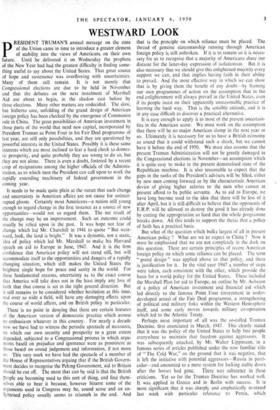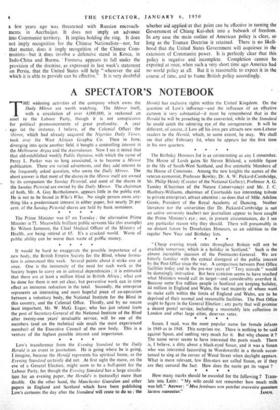WESTWARD LOOK
pRESIDENT TRUMAN'S annual message on the state of the-Union came in time to introduce a greater element of stability into the views of Americans on their own future. Until he delivered it on Wednesday the prophets of the New Year had had the greatest difficulty in finding some- thing useful to say about the United States. That great source of hope and sustenance was overflowing with uncertainties. Many of them still remain. It is not merely that Congressional elections are due to be held in November and that the debates on the next instalment of Marshall Aid are about to begin, in the shadow cast before by those elections. Many other matters are undecided. The slow, but hitherto sure, unfolding of the grand design of American foreign policy has been checked by the emergence of Communist rule in China. The great possibilities of American investment in those parts of the world that need new capital, incorporated by President Truman as Point Foui in his Fair Deal programme of last year, are still only possibilities, and they are questioned by powerful interests in the United States. Possibly it is these same interests which are most inclined to fear a hard check to domes- tic prosperity, and quite probably they are wrong to do so, but they are not alone. There is even a doubt, fostered by a recent crop of resignations among the higher officials of the Adminis- tration, as to which men the President can call upon to work the rapidly extending machinery of federal government in the coming year.
It needs to be made quite plain at the outset that such change and uncertainty in American affairs are not cause for uninter- rupted gloom. Certainly most Americans—a nation still young enough to regard change in the first instance as a source of new opportunities—would not so regard them. The net result of the change may be an improvement. Such an outcome could usually be relied upon in the past. It was hope not fear of change which led Mr. Churchill in 1941 to quote " But west- ward, look, the land is bright." It was a dynamic, nor a static, idea of policy which led Mr. Marshall to make his Harvard speech on aid to Europe in June, 1947. And it is the firm confidence that American policy will not stand still, but will accommodate itself to the opportunities and dangers of a rapidly changing situation, which still makes the United States the brightest single hope for peace and sanity in the world. For these fundamental reasons, uncertainty as to the exact course that America will take does not in the least imply any loss of faith that that course is set in the right general direction. But it still remains to be considered whether hesitation at this time, and over so wide a field, will have any damaging effects upon the course of world affairs, and on British policy in particular.
There is no point in denying that there are certain features of the American version of democratic practice which arouse no enthusiasm whatever in this country. For nearly a decade now we have had to witness the periodic spectacle of measures, on which our own security and prosperity to a great extent depended, subjected to a Congressional process in which argu- ments based on prejudice and ignorance were as prominent as those based on sound judgement and information, if not more so. This very week we have had the spectacle of a member of the House of Representatives arguing that if the British Govern- ment decides to recognise the Peking Government, aid to Britain should be cut off. The most that can be said is that the British people are becoming used to this sort of thing, and find them- selves able to bear it because, however bizarre some of the arguments used in Congress may be, sound sense and an en- lightened policy usually seems to triumph in the end. And that is the principle on which reliance must be placed. The thread of genuine statesmanship running through American foreign policy is still unbroken. If it is to remain so it is neces- sary for us to recognise that a majority of Americans share our distaste for the latter-day expression of isolationism. But it is also necessary that we should give this enlightened majority every support we can, and that implies having faith in their ability to prevail. And the most effective way in which we can show that is by giving them the benefit of any doubt—by framing our own programmes of action on the assumption that in the end enlightenment will always prevail in the United States, even if its people insist on their apparently unreasonable practice of learning the hard way. That is the sensible attitude, and it is in any case difficult to discover a practical alternative.
It is easy enough to apply it to most of the present uncertain- ties in the American scene. We must work on the assumption that there will be no major American slump in the next year or so. Ultimately it is necessary for us to have a British economy so sound that it could withstand such a shock, but we cannot have it before the end of 1950. We must also assume that the present Truman Administration will not be greatly damaged in the Congressional elections in November—an assumption which it is quite easy to make in the present demoralised state of the Republican machine. It is also reasonable to expect that the gaps in the ranks of the President's advisers will be filled, either by new men coming forward or by the characteristic American device of giving higher salaries to the men who cannot at present afford to be public servants. As to aid to Europe, we have long become used to the idea that there will be less of it after April, but it is still difficult to believe that the opponents of E.R.P. will be allowed to destroy the good it has already done by cutting the appropriation so hard that the whole programme breaks down. All this tends to support the thesis that a policy of faith has a practical basis.
But what of the question which bulks largest of all in present American policy ? What are we to expect in China ? Now it must be emphasised that we are not completely in the dark on this question. There are certain principles of recent American foreign policy on which some reliance can be placed. The term " grand design " was applied above to that policy, and there is justification for it. In the vital year 1947 a number of steps were taken, each consistent with the other, which provide the basis for a world policy for the United States. These included the Marshall Plan for aid to Europe, an outline by Mr. Acheson of a policy of American investment and financial aid which led directly to the famous Point Four (investment in under- developed areas) of the Fair Deal programme, a strengthening of political and military links within the Western Hemisphere itself, and some early moves towards military co-operation which led to the Atlantic Treaty.
Perhaps most important of all was the so-called Truman Doctrine, first enunciated in March, 1947. This clearly stated that it was the policy of the United States to help free people everywhere to maintain that freedom against aggressors. It was subsequently attacked, by Mr. Walter Lippmann, in a famous series of articles published under the now familiar title of " The Cold War," on the ground that it was negative, that it left the initiative with potential aggressors—Russia in parti- cular—and amounted to a mere system for locking stable doors after the horses had gone. There was substance in these criticisms. Yet so far the Truman Doctrine has worked well. It was applied in Greece and in Berlin with success. It is most significant that it was sharply and emphatically re-stated last week with particular reference to Persia, which a few years ago was threatened with Russian encroach- ments in Azerbaijan. It does not imply an advance into Communist territory. It implies holding the ring. It does not imply recognition for the Chinese Nationalists—nor, for that matter, does it imply recognition of the Chinese Corn- ' munists—but it does involve a defensive stand in Korea, in Indo-China and Burma. ' Formosa appears to fall under the provision of the doctrine, as expressed in last week's statement on Persia, that the United States will help " wherever the aid which it is able to provide can be effective." It is very doubtful. whether aid applied at that point can be effective in turning the Government of Chiang Kai-shek into a bulwark of freedom. In any case the main outline of American policy is clear, so long as the Truman Doctrine is retained. There is no likeli- hood that the United States Government will acquiesce in the extension of Communist power. It is perfectly clear that this policy is negative and incomplete. Completion cannot be expected at once, when such a very short time ago America had no world policy at all. But it is reasonable to expect it in the course .of time, and to frame British policy accordingly.







































 Previous page
Previous page